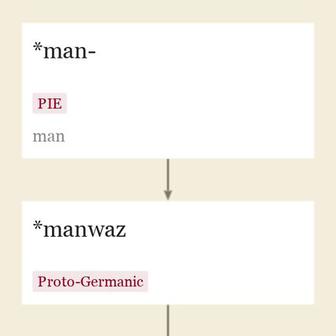frogman (n.)
"橡胶衣潜水员",1945年,来自 frog(n.1)+ man(n.)。
frogman 的相关词汇
古英语中的 frogga "frog",是 frosc, forsc, frox "frog"的一个小词,这是一个常见的日耳曼语词,但其构成方式各异,难以解释(同源词:古挪威语 froskr,中荷兰语 vorsc,德语 Frosch "frog"),可能字面意思是"跳跃者"(如果源自 PIE 词根 *preu- "跳跃",也是梵文 provate "跳跃",俄语 prygat "跳跃,跳跃"的来源)。Watkins 称古英语中的 -gga 为"模糊的表达后缀"。
拉丁语中的词(rana)是模仿青蛙叫声的。在中古英语中也有 frok, vrogge, frugge,并有时以复数形式 froggen 出现。中古英语的并列形式 frude, froud 来自古挪威语的 frauðr "frog",而本土的替代形式 frosk "frog"在19世纪的英语方言中仍然存活。
I always eat fricasseed frogs regretfully; they remind one so much of miniature human thighs, and make one feel cannibalistic and horrid .... [H. Ellen Browning, "A Girl's Wanderings in Hungary," 1896]
我总是带着遗憾吃炖青蛙; 它们让人想起了迷你版的人类大腿,让人感觉像是食人族,感觉很恐怖.... [H. Ellen Browning, "A Girl's Wanderings in Hungary," 1896]
作为对"法国人"的英国贬义词,1778年(简称 frog-eater),但在此之前(1650年代)它意味着"荷兰人"(来自 frog-land "沼泽地",指他们的国家)。
The principal inn on the island of Texel is called the Golden Frog, (de Goude kikker). We may wonder that there are not more examples of this sign in Holland, for there are, without doubt, as many frogs in that country as there are Dutchmen ; and even unto this day it is a mooted point, which of the two nations has more right to the possession of the country ; both however are of a pacific disposition, so that they live on in a perfect entente cordiale. [Larwood and Hotten, "The History of Signboards," 1866]
特克塞尔岛上的主要旅馆被称为金蛙(de Goude kikker)。我们可能会惊讶于荷兰没有更多这样的标志,因为毫无疑问,那个国家的青蛙和荷兰人一样多; 甚至到今天,两个国家对于谁更有权拥有这个国家的问题仍然存在争议; 然而,两者都是和平的,所以他们以完美的 entente cordiale 生活着。[Larwood and Hotten, "The History of Signboards," 1866]
有一个 frog in the throat "嗓子沙哑"是从1892年开始的,来自 frog 作为口中肿块或肿胀的名字(1650年代)或喉咙感染引起的嘶哑声。

"Homo 的无羽植物行走的两足哺乳动物" [世纪词典],古英语 man, mann "人类,男人(或女人); 勇敢的男人,英雄; " 还有 "仆人,家臣,被视为受他人控制的成年男性",源自原始日耳曼语 *mann-(也是 Old Saxon,瑞典语,荷兰语,Old High German man,Old Frisian mon,德语 Mann,Old Norse maðr,丹麦语 mand,哥特语 manna "男人"),源自 PIE 词根 *man-(1)"男人"。关于复数形式,请参见 men。
有时与词根 *men-(1)"思考"相关联,这将使 man 的基本意义为"有智慧的人",但并非所有语言学家都接受这一观点。例如,利伯曼写道:"最有可能的是 man '人类' 是一个世俗化的神名",源自 Mannus [Tacitus, "Germania," chap. 2],"被认为是人类的祖先"。
"人类的成年男性"的特定意义(与女人或男孩区分开)可追溯到古英语晚期(约公元1000年); 古英语使用 wer 和 wif 来区分性别,但 wer 开始在13世纪末消失,并被 man 取代。该词的普遍意义仍然存在于 mankind 和 manslaughter 中。同样,拉丁语有 homo "人类" 和 vir "成年男性人类",但它们在通俗拉丁语中合并, homo 扩展到两个意义。斯拉夫语言也发生了类似的演变,在其中一些语言中,该词已经缩小为指"丈夫"。PIE 还有另外两个表示"男人"的词根: *uiHro "自由人"(源自梵语 vira-,立陶宛语 vyras,拉丁语 vir,古爱尔兰语 fer,哥特语 wair; 参见 *wi-ro-)和 *hner "男人",这是一个更有荣誉的称号而不是 *uiHro(源自梵语 nar-,亚美尼亚语 ayr,威尔士语 ner,希腊语 anēr; 参见 *ner-(2))。
Man 也在古英语中作为不定代词,表示"一个人,人们,他们"。到公元1200年左右,它被泛指为"人类,人类"。作为一种亲切称呼的词,最初常常暗示不耐烦,约于公元1400年; 因此,很可能它被用作惊讶或强调的感叹词,自中古英语以来尤其流行。
作为"女人的情人",于14世纪中叶。作为"具有男子气概的成年男性",自14世纪起。Man's man , 指那些被其他男人欣赏的品质,于1873年开始使用。俚语中用 the Man 表示"老板",于1918年开始。"做一个 man or mouse"勇敢或胆小",始于1540年代。意思是"用来玩游戏(尤其是国际象棋)的棋子",始于约1400年。
Man-about-town "经常光顾俱乐部、剧院和其他社交场所的上层阶级男人",始于1734年。Man of the world 自14世纪中叶起指"世俗的人,俗人"; 到15世纪初指"对世事经验丰富的人,能够泰然处之的人"。做某事 as one man "一致地",始于14世纪末。
So I am as he that seythe, 'Come hyddr John, my man.' [1473]
所以我就像那个说,'来这里,约翰,我的人。' [1473]
MANTRAP, a woman's commodity. [Grose, "Dictionary of the Vulgar Tongue," London, 1785]
MANTRAP,女人的商品。[Grose,《俚语词典》,伦敦,1785年]
At the kinges court, my brother, Ech man for himself. [Chaucer, "Knight's Tale," c. 1386]
在国王的法庭上,我的兄弟,每个人都为自己。[乔叟,《骑士的故事》,约1386年]